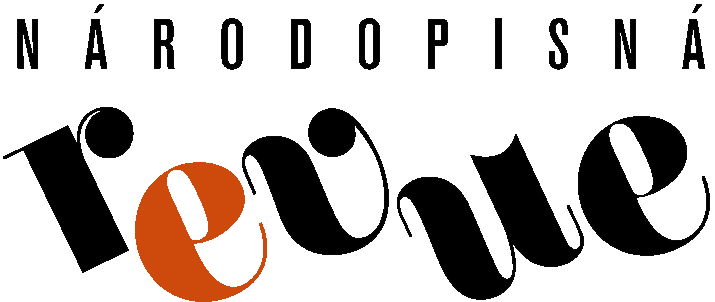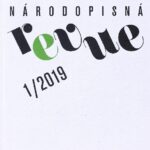Journal of Ethnology 1/2019 deals with the theme “National Schools in Ethnography and Folkloristics”. Giuseppe Maiello focusses on the formation of those disciplines in Italy (On the Development of Italian Folkloristics and Ethnography: from Renaissance collections of folk literature to positivism), Jiří Woitsch submits an overview on the origin of ethnology in Switzerland (Going Their Own Way? The Swiss Ethnology in the 19th and the first half of the 20th Century). Alexandra Bitušíková pays attention to the research into city in Slovak ethnology (The Urban-Ethnological Research in Slovakia in the 21st Century: Reflections and Challenges). Jaroslav Šotola and Mario Rodríguez Polo explain discourses of Romani studies in the Czech environment after 1989 (The Representation of Roma Otherness: a Reflexion of Constructing a Subject-Matter of Czech Social Sciences). Ivan Murín and Gergely Agócs present the application of folkloristics in the realm of folklorism (Applied Folkloristics in Hungary: Case Táncház – Módszer). The methodological essay by Miroslav Vaněk (From One Hundred Student Revolutions to One Hundred Student Evolutions. On the Method of the First Longitudinal Project in Czech Oral History) has been involved out of the main theme.
The Transforming Tradition column publishes a record from the field research into Nicholas door-to-door procession in the village of Lužná in southern Wallachia (by Jana Poláková and Milada Fohlerová). Review Section includes a contribution Bernardino de Sahagún and Beginnings of Anthropology in Mexico (by Oldřich Kašpar) and a reminder on Václav Pletka´s life and work, an important person of Czech musical folkloristics. Social Chronicle publishes a greeting to the life anniversary of the ethnologist Soňa Švecová (born 1929), and obituaries for the Romist Eva Davidová (1932–1918) and the ethnologist Karel Pavlištík (1931–2018). Further regular columns publish reports on exhibitions, conferences, festivals, shows and new publications.
On the development of Italian folklore and ethnography: from Renaissance collections of folk literature to positivism
The study offers a description of the difficulty of describing the boundaries between various study disciplines such as ethnology, folklore and ethnography in the context of pre- and post-unitary Italy. In a specific paragraph are presented the oldest collections of fairy tales, collected by Giovanni Francesco Straparola (1480?-1557), Giambattista Basile (1566-1632) and Pompeo Sarnelli (1649-1724) and the first romantic attempts to comment on oral lore. Other paragraphs are devoted to the italian collectors of folk tales, with a particular attention on Niccolò Tommaseo (1802-1874), Vittorio Imbriani (1840-1886) and Costantino Nigra (1828-1907), and to the theorists of folklore studies Ermolao Rubieri (1818-1879) and Alessandro d'Ancona (1835-1914). The study describes where folklore studies in Italy met with ethnographic studies and where and when they moved away from themselves.
Going Their Own Way? The Swiss Ethnology in the 19th and the first half of the 20th Century
The article submits a chronologically explained development of the Swiss ethnology with an emphasis on the development in the 19th century through the 1960s, whereby the interest in cultural diversity as well as that defined in other ways in older periods is partially included as a theme. Great attention is paid to key personalities in the history of the Swiss ethnology, in particular to Eduard Hoffmann-Krayer and Richard Weiss, and to how they influenced the theoretical and methodological as well as thematic shifts in the orientation of the discipline. Further significant persons and important works of the Swiss ethnology are mentioned as well, and the institutional basis of the discipline is described. The author presents the Swiss ethnology as quite a peculiar and progressive research discourse. This was formed under a strong influence of the German Volkskunde, but evolving in a country featuring a specifically multi-ethnic composition of the population, a significantly different historical development, as compared to Germany, and special, even extreme natural and geographical conditions that contributed to the survival of many archaic elements of the so-called folk culture until the 20th century.
The Urban-Ethnological Research in Slovakia in the 21st Century: Reflections and Challenges
The paper brings an overview of the development of urban-ethnological research in Slovakia with a special focus on the first two decades of the 21st century. It also briefly defines key milestones, thematic areas and methodical approaches in the older periods, which are necessary for the understanding of further developments. It introduces key personalities who formed urban ethnology and who influenced the establishment of the sub-discipline within the ethnology and social anthropology development in Slovakia. The main objective is to focus on changes in the approach to the urban ethnological/anthropological research in Slovakia in the 21st century, particularly on changes in topics, theoretical concepts, and methodical approaches, and to propose new visions and opportunities in line with the global trends in urban anthropology.
The Representation of Roma Otherness: a Reflexion of Constructing a Subject-Matter of Czech Social Sciences
Since the year 1989, we can observe a significant development of the scholarly interest in Romani population in the Czech environment. We believe, however, that the way of constructing the research subject-matter after November 1989 did not bring a corresponding framework for the reduction of social marginalization of the Romani people. In the text, we analyse examples of three different approaches to the study of Romani people whereby we see a paradox in the fact that although these approaches hide behind the emphasis on “the support of understanding”, “the search for problems´ roots”, and “the proposal of solutions”, their way of otherness conceptualization in fact does not offer any alternative to the public discourse within which the Romani people are perceived as being “fundamentally different”. For this reason we suggest to move attention from the discussions searching for an explanation concerning the otherness of Romani people to the research into the logics of its reproduction within the science. In the text, we focus on the reflexion of the most significant expressions of Romani people´s exoticness and the related limits within the explanation potential for the understanding of social reality. The Romani people´s otherness, in our opinion, is irreplaceable as the theme for ethnographic research, but only providing the reflexivity of epistemological position, the understanding of otherness as (re)produced by social practice, and the thorough involvement of the broader all-society context in the entire analysis.
Applied Folkloristics in Hungary: Case Táncház – Módszer
The media success of the Hungarian and Slovak folklore show anew has opened up a discussion about the current forms of folklorism. Less known is the development of folkloristics that it has passed through - beginning with theoretical schools of historical and musical folklore to its application to public sphere. The contemporary folklorism boom in Hungary is associated with the attempt of Hungarian folklorists´ to renew the older forms of Hungarian traditional culture by means of scenic (art) and public presentations. These best practice methods (UNESCO) become theoretical and methodological concepts of Hungarian folklorists and ethnomusicologists. The aim of this study is to inform the readers with Hungarian schools of historic and music folklore research, which is directly related to the applied method, also called Táncház - módszer. The study is one of the reflections concerning discussions within folklorism - scenic art versus public spread, and creation versus citation of folklore contents.
From One Hundred Student Revolutions to One Hundred Student Evolutions. On the Method of the First Longitudinal Project in Czech Oral History
This contribution is based on two projects, twenty years apart, which are dedicated student activists of 1989. The project Students during the Fall of Communism in Czechoslovakia – Biographical Interviews (1997-1999) was a key to the development of oral history in the Czech Republic. The current follow-up longitudinal project The Student Generation of 1989 in Longitudinal Perspective has an ambition to capture the influence of the formative experience of the revolution of November 1989 on the life stories of the narrators, former student activists of 1989, in their personal, professional, and political dimensions. The longitudinal approach, which was applied for the first time in Czech oral history, is discussed in the paper also from the point of view of psychologists and documentary filmmakers, and a similar project of Czech ethnologists, focusing on the folklore movement in totalitarian Czechoslovakia, is also mentioned. The author describes the problems of the role of an insider in collecting interviews, as well as in conducting the interviews by individual younger interviewers. Special attention is paid to the phenomenon of “longitudinality within longitudinality”, i.e. a period between the realization of the first and the follow-up interviews, during which presidential and parliamentary elections took place, which the narrators reacted mostly negatively to. Changes in their personal lives – if mentioned by the respondents – were not vocalized as strongly as the country’s social situation.



